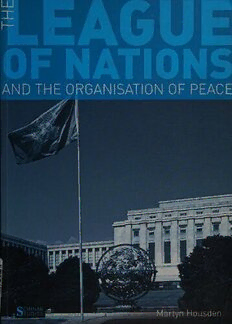
The League of Nations and the Organisation of Peace PDF
Preview The League of Nations and the Organisation of Peace
artym’ Housden rN. AS Poses "9781405840583 9781405874328 EMINAR TUDES 9780582299085 “9781405874342 9781408205167 The League of Nations and the Organisation of Peace The League of Nations and the Organisation of Peace Martyn Housden aDBay a> — Longman is an imprint of PEARSON ee Harlow, England » London » New York * Boston « San Francisco * Toronto Sydney « Tokyo « Singapore + Hong Kong « Seoul « Taipei New Delhi Cape Town « Madrid * Mexico City » Amsterdam * Munich » Paris » Milan PEARSON EDUCATION LIMITED Edinburgh Gate Harlow CM20 2JE United Kingdom Tel: +44 (0)1279 623623 Fax: +44 (0)1279 431059 Website: www.pearson.com/uk First edition published in Great Britain in 2012 © Pearson Education Limited 2012 ' hos The right of Martyn Housden to be identified as author of this work has been asserted by him in accordance with the Copyright, Designs and Patents Act 1988. Pearson Education is not responsible for the content of third-party internet sites. ISBN: 978-1-4082-2824-1 British Library Cataloguing in Publication Data A CIP catalogue record for this book can be obtained from the British Library Library of Congress Cataloging in Publication Data Housden, Martyn, 1962— The League of Nations and the organisation of peace / Martyn Housden. p. cm. Includes bibliographical references and index. ISBN 978-1-4082-2824-1 (pbk.) 1. League of Nations—History. 2. Peace—International cooperation. 1. Title. JZ4871.H68 2011 341.22—dce23 2011033604 All rights reserved; no part of this publication may be reproduced, stored in a retrieval system, or transmitted in any form or by any means, electronic, mechanical, photocopying, recording, or otherwise without either the prior written permission of the Publishers or a licence permitting restricted copying in the United Kingdom issued by the Copyright Licensing Agency Ltd, Saffron House, 6-10 Kirby Street, London ECIN 8TS. This book may not be lent, resold, hired out or otherwise disposed of by way of trade in any form of binding or cover other than that in which it is published, without the prior consent of the Publishers. LOR SO Si On each"ee e Moy aly MS lat Set 10/13.5pt Berkeley Book by 35 Printed in Malaysia (CTP-PPSB) Introduction to the series History is narrative constructed by historians from traces left by the past. Historical enquiry is often driven by contemporary issues and, in con- sequence, historical narratives are constantly reconsidered, reconstructed and reshaped. The fact that different historians have different perspectives on issues means that there is also often controversy and no universally agreed version of past events. Seminar Studies was designed to bridge the gap between current research and debate, and the broad, popular general surveys that often date rapidly. The volumes in the series are written by historians who are not only familiar with the latest research and current debates concerning their topic, but who have themselves contributed to our understanding of the subject. The books are intended to provide the reader with a clear introduction to a major topic in history. They provide both a narrative of events and a critical analysis of contemporary interpretations. They include the kinds of tools generally omitted from specialist monographs: a chronology of events, a glossary of terms and brief biographies of ‘who’s who’. They also include bibliographical essays in order to guide students to the literature on various aspects of the subject. Students and teachers alike will find that the selection of documents will stimulate discussion and offer insight into the raw materials used by historians in their attempt to understand the past. Clive Emsley and Gordon Martel Series Editors To the usual suspects Contents Acknowledgements Publisher’s acknowledgements x1 Chronology Who’s who xvi Glossary xviii PART ONE ANALYSIS INTRODUCTION: ORGANISING THE PEACE OF THE WORLD WHAT WAS THE LEAGUE OF NATIONS? What Was the League of Nations and Why Study it Today? A Complicated Character: Super-State, Commonwealth, Utopia? The Covenant of the League of Nations SFOOON Structure of the Organisation Historiography: The League as Success or Failure? 16 Conclusion 18 HOW NEW WAS THE LEAGUE OF NATIONS? 20 Introduction: Disillusionment with the Balance of Power 20 Distant Origins 21 Nineteenth Century: The Concert of Europe and Arbitration 22 Nineteenth Century: Globalisation, Humanitarianism, Pacifism and National Minorities 25 The Legacy of War 29 Woodrow Wilson and the Peace Settlement 32 Omissions, but Optimism Nonetheless a4 Conclusion 36 viii THE LEAGUE OF NATIONS AND THE ORGANISATION OF PEACE A PROMISING START? DISPUTES, BORDERS AND NATIONAL 38 MINORITIES IN THE 1920s 38 Introduction: The Spirit of the Age 39 Settling Disputes Peacefully in the 1920s 44 Assigning Territories and Drawing Borders : 50 National Minorities: Trying to Remove a Cause of War 55 Conclusion INTERNATIONAL HUMANITARIAN ACTION: REFUGEES AND SECURITY at Introduction 57 Taking Soldiers Home, 1920-22 59 Flight and Repatriation: Russian Refugees, 1920-25 62 Exchanging Populations: Greece and Turkey 66 The Armenians: Suffering without a Nation State 70 Refugees in the 1930s re: Conclusion as REMOVING THE CAUSES OF WAR: SOCIAL AND ECONOMIC PROJECTS Le: Introduction io Curing the World 76 The Drugs Trade 80 Salvaging Humans and Preventing People-Trafficking 82 Abolishing Slavery and its Kindred Forms 84 Beyond Imperialism: Mandates 86 Economics of Peace: Social Justice and International Stability 88 Conclusion: Organising Peace and Removing the Causes of War 91 THE LEAGUE BETRAYED: COLLECTIVE SECURITY IN THE 1930s AND DISARMAMENT 93 Introduction 93 Disarmament: An Impossible Quest? 94 Manchuria: A Turning Point for Collective Security? 98 The Abyssinian Crisis 102 Early Moves to Reappraise Collective Security: Addressing the Causes of War 106 Conclusion 108 CONCLUSION: ASSESSING THE LEAGUE OF NATIONS 111 A Path-Breaking Organisation 198! Changing Convictions Liz Balance 1i2
